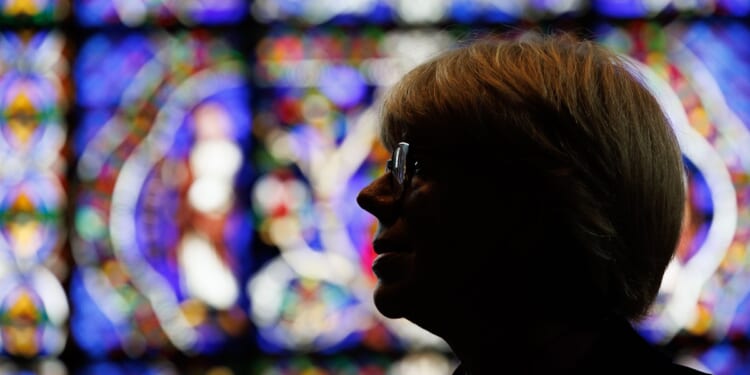I WAS boggled by the quote caught by Gerry Lynch in his radio column this week: Cathy Newman asked on Times Radio, in all seriousness, whether Bishop Mullally could last long enough to be officially consecrated as Archbishop of Canterbury. Ms Newman apparently believes that it was journalistic attacks alone that brought down Archbishop Welby rather than the open hostility or tacit indifference of his colleagues; and that attacking “the Church of England” for safeguarding scandals now 30 or 40 years in the past will have the same effect the second time around.
This is an object lesson in the danger of believing your own propaganda, or supposing that the comments section of Thinking Anglicans represents opinion in the wider Church.
In fact, we see that the political factions that united to attack Archbishop Welby — represented by the Revd Marcus Walker, the Revd Dr Ian Paul, and the Revd Robert Thompson — all agree that his successor is an improvement. This is just as prophecy foretold (in last week’s column), because all of them are still able to believe that she will advance their quite incompatible agendas. All of them also understand that to lose one Archbishop to Cathy Newman is a misfortune, but to lose two would have made the Church ridiculous.
The Times and the Telegraph both got the statutory quote from Andrew Graystone about how survivors were shocked and disappointed by her appointment. In the Telegraph: “Andrew Graystone, an advocate for victims and survivors of Church-related abuse, added: ‘This has caused real shock and dismay amongst victims and survivors who have been in touch with me. The Diocese of London has a disastrous track record of safeguarding failures.’”
I admit that I had thought that the backlog of safeguarding stories in the diocese of London — in particular, the Fr Alan Griffin case (News, 6 July 2022) — would count against Bishop Mullally. But, when you look at the story closely — and Tim Wyatt has covered it in careful detail (Press, 5 April 2024) — the problem there was overzealous, bureaucratised, and botched safeguarding: a problem of false stories taken seriously rather than true ones ignored. That is not what’s generally meant by safeguarding scandals, and we can hope that lessons have been learned.
With hindsight, I should have trusted a Crown Nominations Commission chaired by the former head of MI5 to know how to vet candidates; and it would be nice to believe that it was an MI5-inspired disinformation operation that led Ms Newman to speculate that the chosen candidate would be the Bishop of Gloucester, the Rt Revd Rachel Treweek.
The lack of dedicated staff religious correspondents did shine through the coverage of Bishop Mullally’s nomination. Good journalists, such as Kaya Burgess of The Times, simply don’t any longer have the time to sink into the subject, because time spent out of the office getting to understand a complex subject and gaining the trust of the people you write about is time not spent writing about it. I used to argue that the value of a specialist correspondent was to be measured as much in the stories that they kept out of the paper as in those that they got in. But value to whom? No one can sell advertising against a story that doesn’t appear.
None the less, the coverage of the abuse scandal would be rather improved if anyone noticed that the survivors even of Smyth’s abuse are not a united body: in fact, if the lawsuit against St Andrew the Great, Cambridge, goes ahead, all sorts of complications and ambiguities will come to light to spoil the simple story.
I don’t just want to criticise the press in this. The Lambeth Palace communications department — as distinct from the Church House operation — was startlingly difficult to deal with. I was hoping to watch the Archbishop-designate’s speech on the live stream, as the operational note sent out before the ceremony suggested. But, when I found the Lambeth Palace YouTube page, the most recent video showed a middle-aged bloke sitting in a chair and talking about the refurbishment of the building. It had garnered 506 views in the two months that it had been up. That sort of thing needs to be done as a proper video, or as a press release.
And, if it’s a press release, it would help to have snappier headlines than “The Rt Revd and Rt Hon Dame Sarah Mullally DBE to become 106th Archbishop of Canterbury.” This reads like a bad parody of the Court Circular. It emphasises everything that makes the Church look grotesquely self-important. The general crisis of authority means that these titles no longer function as marks of achievement — however deserved, which, in her case, they clearly are — but just seem vain baubles.
















